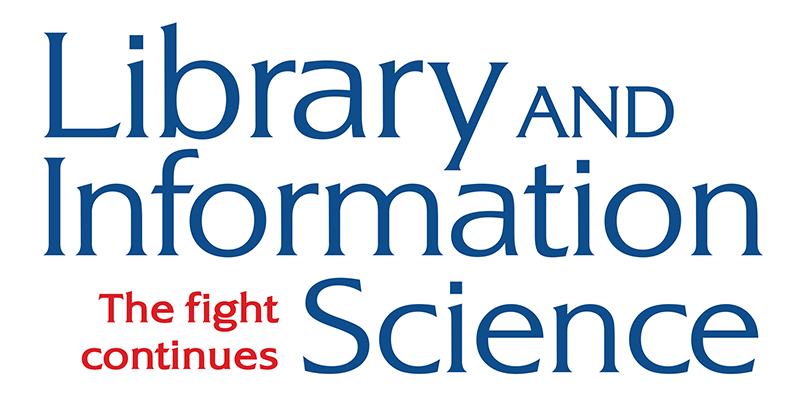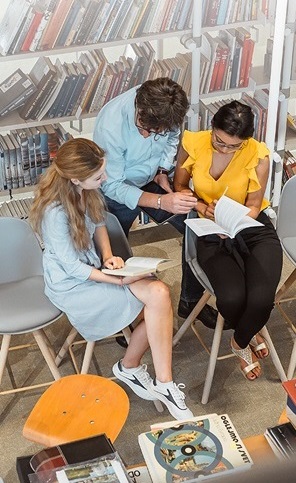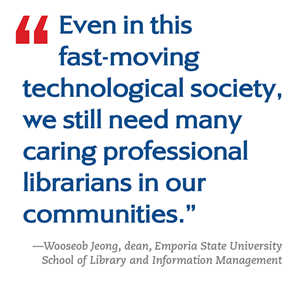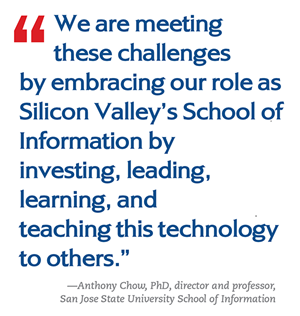Library and Information Science: The fight continues
Keeping up with the constantly changing technological and information landscape has presented a major challenge to the field of library science. Here are some of the leading library and information science (MLIS) master’s degree programs that are stepping up to meet these challenges.


By J.B. Levine
Keeping up with the constantly changing technological and information landscape has presented a major challenge to the field of library science. But the ongoing fight for intellectual freedom presents an even bigger challenge—and a more insidious one, that goes to the very heart of librarianship and its enduring values.
“We are in the midst of an unprecedented, well-funded, and well-organized attack on intellectual freedom,” says Don Hamerly, professor and director, Dominican University School of Information Studies (SOIS). “The fundamental core values, ethics, and competencies that MLIS programs teach have not changed, but the world of information changes in dramatic and unpredictable ways that challenge the ability of librarians and other information professionals to exercise professionally what they learn in their graduate programs.”
The role of libraries—and librarians—is transforming. Since their extended societal role in their communities during the pandemic, librarians have been at the forefront of the “culture wars,” helping patrons learn how to access information they can trust, mentoring and helping them improve their digital and information literacy skills, and advocating for informational and intellectual freedom.
libraries—and librarians—is transforming. Since their extended societal role in their communities during the pandemic, librarians have been at the forefront of the “culture wars,” helping patrons learn how to access information they can trust, mentoring and helping them improve their digital and information literacy skills, and advocating for informational and intellectual freedom.
As the information landscape continues to evolve, the programs that are training library professionals must as well. “MLIS programs must prepare our future LIS professionals for this period of rapid change by grounding them in the core democratic values of the field and empowering them with robust and agile skills to meet the broader array of community and individual demands,“ says Anthony Chow, PhD, Director and Full Professor, San Jose State University School of Information.
Here are some of the leading library and information science (MLIS) master’s degree programs that are stepping up to meet these challenges.
Old Dominion University
Old Dominion University is the only institution offering the Master of Library and Information Studies degree in the Commonwealth of Virginia. The program’s mission is to prepare socially responsible graduates for fulfilling library and information careers characterized by ethical practice, professional values, analytical skills, leadership, and lifelong learning.
The MLIS degree at ODU is a 30-credit-hour, asynchronous online program that is accredited by the American Library Association. Hallmarks of the program include its competitive tuition rates for those in-state as well as globally, its focus on authentic practice, the national reputation of its faculty, and its demographic diversity.
The MLIS program is home to 400 enrollees, the majority of whom are working while they complete their degree. Students are required to complete a shared core of four courses and an internship course. Then, they move into areas of career interest. Coursework might focus on type of library—school, public, academic, and specialized libraries and collections—or any area of library and information work such as youth services or evaluation and assessment. The coursework allows students to engage in authentic practice through assignments, internships, and other practical experiences.
Burns adds that, “our program is situated within the university to foster collaboration with other disciplines. This increases the opportunities our students can explore to build a plan of study that meets their future career goals.”
Though the program is online, community with and amongst students is a value shared by all faculty. A Foundations course encourages interactions with classmates and instructors. A Canvas space dedicated to student advising serves as a fulcrum for program information and for connecting students. And an active ALA Student Chapter, student/alumni gatherings, and other in-person events help build a sense of community.
From their first course, students are encouraged to start building their professional network. The program offers career advising, and the university’s career services center and internship office are available to MLIS students.
While ODU’s MLIS program is very new (it started in 2019), it’s already seeing tremendous success. Employment for 2022 MLIS graduates after one year was 88 percent. And two students from the program were selected as ALA Emerging Leaders.
Emporia State University
Emporia State University School of Library and Information Management (SLIM) has the distinction of being the oldest school of library and information studies in the western half of the United States. Located in Emporia, Kansas, the school has been “educating a diverse population of library and information professionals with imagination, creativity and innovations” for 118 years.
“We really focus on librarianship,” says Dean Wooseob Jeong. “We are not an iSchool.”
SLIM’s Master of Library Science program is a 36-credit-hour degree program that was recently awarded continuous-accreditation status from the ALA. The program is fully online and asynchronous, accommodating the schedules of 375 adult students, many of them juggling jobs and family responsibilities. Other benefits offered by SLIM include affordability (tuition and fees have not increased for the past two years), small class sizes, and dedicated faculty and academic advisors.
The program’s goal is to prepare creative problem solvers who will provide proactive, client-centered services in libraries and other information agencies. “With the degree, professional librarians are equipped with the skills to identify their communities’ needs,” says Jeong.
Toward this end, the SLIM curriculum combines a solid theoretical base with current best practices in the field. Core theory courses provide the foundational skills necessary for the information management profession. Tools courses focus on planning and evaluating information services, using print and electronic sources, and cataloging, classifying, retrieving, and repackaging information. Applications courses focus on information transfer, global information infrastructure, management, and technology. Elective courses focus on current issues in the field. A capstone experience synthesizes the educational experience, preparatory to entering the profession.
Concentrations are offered in archive studies, health information, informatics, leadership & administration, youth services, outreach and community engagement.
While SLIM provides a traditional library science program, it also includes relevant technology components in both core courses and electives. The curriculum is constantly updated to keep pace with technological and societal changes and trends. New courses added to the curriculum include “AI in Libraries,” “Games in Libraries,” and “Librarianship and Correctional Facilities.” Plus, the program recently added an instructional & technology concentration.
 SLIM faculty teach all the required theory courses as well as most of the elective offerings. Certain elective courses are taught by qualified practitioners whose expertise matches the course topic.
SLIM faculty teach all the required theory courses as well as most of the elective offerings. Certain elective courses are taught by qualified practitioners whose expertise matches the course topic.
At Emporia, the learning does not stop with coursework. The program takes pains to create a sense of community for students with many out-of-class activities. This summer and at the start of fall term, SLIM offered more than a dozen synchronous virtual social hours in which faculty, advisors, and students shared interests and ideas freely. The program’s student organization, SCALA, is also very active, organizing book club discussions with alumni and craft gatherings virtually.
SLIM is also dedicated to helping students with job placement upon graduation. The school sends weekly job lists to current students, as well as posting them on the program’s website. The campus career service also offers virtual options, with online career-advising sessions and the opportunity for students to participate in virtual mock interviews. Plus, students can tap into the school’s 3,300-strong alumni network, giving them entrée to state libraries and library associations, major academic libraries, and library systems throughout the country.
“Even in this fast-moving technological society, we still need many caring professional librarians in our communities. SLIM will continue to strive to provide a quality library science education with affordable tuition and wonderful student services,” says Jeong.
For more information, visit: www.emporia.edu/slim
The Palmer School of Library and Information Science, LIU
The Palmer School of Library and Information Science at Long Island University is unique in that it confers both MSLIS and PhD degrees in Information Studies. Located at the LIU Post campus in Brookville, Long Island, Palmer is a full member of the iSchools consortium and has one of the largest LIS programs in the New York metropolitan area.
Like many information science institutions, Palmer’s mission is not simply to contribute knowledge in library and information studies through education and scholarship, but “to instill in the information professions a commitment to the free flow of information, to service excellence, and to socially responsible uses of technology.”
The school offers a broad portfolio of degree options designed to prepare individuals for careers in information science, including the fully ALA-accredited MS in Library and Information Science. The master’s offers concentrations in public librarianship; rare books and special collections; and academic and special librarianship. Courses largely meet online, though some concentrations also have face-to-face classes.
The 51-credit Doctor of Philosophy in Information Studies is the only program of its kind in the New York City area. The program utilizes a strong interdisciplinary approach to both scholarship in the burgeoning field of information studies and the development of problem-solving skills for practitioners involved in organizing, storing, retrieving, and distributing massive quantities of information. Highly selective, a maximum of 20 students are admitted each year to the PhD program. Doctoral courses are online only.
The Palmer School’s 225 students range in age from 21–65! Some students start their master’s immediately after finishing their bachelor’s degrees. Others enter the program as a change of career or a viable occupation upon retiring from a previous profession. Students benefit from easy access to a distinguished faculty who are committed to their students’ success. An internship requirement ensures that they enter the field with hands-on experience and strong recommendations.
For more information, visit: https://www.liu.edu/post/academics/palmer-school-of-library-information-science/academic-programs
University of Wisconsin–Milwaukee
The University of Wisconsin–Milwaukee addresses the dual challenges of keeping abreast of rapid technological changes and the proliferation of information directly with a curriculum that keeps pace with evolving technology. Frequent consultations with the MLIS advisory board ensure that the program’s coursework is not just relevant, but progressive and future focused.
“The School of Information Studies MLIS program allows students to focus on traditional librarianship, but also offers courses in areas like data science, information security, and information technology for future-prepared library and information professionals,” says Assistant Dean Chad Zahrt.
The MLIS pr ogram is primarily online and offers an innovative and collaborative curriculum for its 350 students that fuses core MLIS concepts with new and emerging technologies. A systemic program grounds students in the principles of library and information science, while proffering elective coursework in human-computer interaction (HCI), web design, and information security.
ogram is primarily online and offers an innovative and collaborative curriculum for its 350 students that fuses core MLIS concepts with new and emerging technologies. A systemic program grounds students in the principles of library and information science, while proffering elective coursework in human-computer interaction (HCI), web design, and information security.
UWM’s online tuition rate eliminates non-residency rates, creating an affordable MLIS option. Plus, the soon-to-be launched (2025) Prior Learning Assessment will reduce the cost of attendance even more. New students will have the opportunity to have prior professional work experience evaluated and credited toward their MLIS degree—a huge boon for SOIS’s many older students who need an MLIS to advance their careers.
SOIS is committed to supporting students throughout the program. In addition to having a dedicated MLIS academic advisor, all students are introduced to faculty during orientation sessions. Faculty mentors help students explore career and research opportunities and build their professional networks. Numerous social and professional events, such as research presentations, student research day, alumni networking events, and career exploration events are scheduled across the year.
MLIS students also have a career services advisor to help with employment upon graduation. A “Professional Immersion Day” is held each fall and features panel discussions and speed dating-style sessions with professionals in the field. SOIS also holds “Enhance Your Chance” events that focus on resume reviews, mock interviews with hiring professionals, and career-related workshops. A weekly newsletter announces internships and job opportunities, as well as networking events.
“UWM SOIS’s long history with online education, along with our dedicated student services team, means students can expect a world-class educational experience—one that we are very proud to offer,” says Zahrt.
For more information, visit: ischool.uwm.edu/
San José State University
San José State University School of Information (iSchool) is the largest MLIS degree provider in the world. The program has 2,600 active students across all 50 states and 11 countries, representing 14 percent of all MLIS students in 2023. It is also the most diverse program and ranks #1 across all racial and ethnic categories, a point of pride for the iSchool.
The post-pandemic reality in library and information science professions is defined by rapid change. Anthony Chow, PhD, director and professor at the iSchool, points to several major challenges facing new librarians today: the need to advocate for the field, the increase of technology and the concomitant need to ensure access for all, and the need to continuously build digital skills and adapt to new technologies like AI.
 “We are meeting these challenges by embracing our role as Silicon Valley’s School of Information by investing, leading, learning, and teaching this technology to others and also ensuring that our programs are competency-based and aligned to the current and future needs of our field,” says Chow.
“We are meeting these challenges by embracing our role as Silicon Valley’s School of Information by investing, leading, learning, and teaching this technology to others and also ensuring that our programs are competency-based and aligned to the current and future needs of our field,” says Chow.
The MLIS program is 100 percent online, asynchronous, and designed for maximum support and convenience for students, 75 percent of whom are working adults. Chow notes that students are highly satisfied with both the quality of the program instructors, who are leaders in the field, and the breadth and expansiveness of the curriculum and courses offered.
The program consists of 43 semester units, with 16 units of required courses and 27 units of electives chosen from 14 optional career pathways. The career pathways are curated lists of electives that serve as guidance in choosing electives and include areas such as leadership and management, emerging technologies, academic librarianship, and information organization. Many students mix and match electives from multiple pathways to achieve a custom path through the degree. Four full-time advisors and an additional 10 full-time staff support the faculty and students.
While the program is fully online, students are not lacking in direct contact with faculty and staff. Professors and adjuncts are available 24-7 through chat, Zoom, chatbot, and email. Faculty pathway advisors are organized by their LIS specialties and are available to help students narrow their elective choices toward their learning and career objectives. Students can also work with a student services advisor to use eAdvising tools to plan a customized MLIS program, ask questions about preparing for e-Portfolio, plan for an internship, or complete graduation paperwork.
The SJSU iSchool also takes many steps to create community among students. Free memberships to the American Library Association and to the student’s state library association are offered for the first two years of the program. Student groups, conference meetups, receptions, and social media accounts are also provided for current students and alumni.
The iSchool is a leader in career-development support for new LIS professionals. A full-time career consultant works individually with students on career strategy and runs workshops, while staff at the SJSU Career Center review their resumes and cover letters in preparation for the job search. A major career boost for new graduates is SJSU iSchool’s 13,000 alumni worldwide, giving students access to a huge and geographically wide-ranging network.
“We are High Tech, High Touch, and High Quality and align our resources and day-to-day activities to live our mission for our students and the faculty and staff that serve them. This creates a strategically focused and world-class teaching and learning environment. Our graduates enter the field well prepared and agile to meet the demands of our uncertain future,” says Chow.
For more information, visit: ischool.sjsu.edu
Dominican University
“The most urgent challenge for library and information professionals entering the field now is learning how to navigate an information landscape that often directly challenges what we work so hard to promote: diversity of thought, critical reasoning, freedom of expression, and social responsibility,” says Don Hamerly, director and professor, Dominican University School of Information Studies (SOIS).
Located on 37 verdant acres in River Forest, Illinois, Dominican University SOIS offers degree and certificate programs that promote radical inclusion and empower students to create positive change. “We are committed to creating a future where information literacy is universal,” says Hamerly. The master’s program offers a combination of on-campus, online asynchronous, and hybrid courses. Students can complete the MLIS entirely online or opt for an on-campus experience at a small suburban university.
 To meet the information and technological environment into which Dominican’s students will graduate, the MLIS program features state-of-the-art technology, new and engaging learning spaces, and a cutting-edge curriculum. These components have earned Dominican the ranking of #1 Most Innovative School in Illinois from U.S. News & World Report . “I can’t imagine a current MLIS program without a strong emphasis on technology-driven information creation and access,” Hamerly notes.
To meet the information and technological environment into which Dominican’s students will graduate, the MLIS program features state-of-the-art technology, new and engaging learning spaces, and a cutting-edge curriculum. These components have earned Dominican the ranking of #1 Most Innovative School in Illinois from U.S. News & World Report . “I can’t imagine a current MLIS program without a strong emphasis on technology-driven information creation and access,” Hamerly notes.
In Dominican’s relationship-focused and social justice-driven program, 307 students benefit from a low student-teacher ratio and access to a devoted faculty both in and out of class. The program also takes steps to create community among the MLIS students, with active student chapters of ALA and SAA that host in-person and virtual activities and field excursions in the Chicagoland area.
SOIS’s award-winning Office of CareerPrograms and Employer Relations at Dominican offers a range of supports and programs for students transitioning from graduate school to work. Experiential learning through practicums and internships helps prepare students for their real-world roles and frequently leads to permanent positions in nearby Chicago, one of the most information- and opportunity-rich hubs in the U.S.
“At Dominican University, we teach theoretical concepts, but we also stress the importance of practical experience and professional mentorship that will contribute further to students’ joining the profession,” says Cecilia Salvatore, professor, director, and interim associate dean of the College of Applied Social Sciences.
For more information, visit: ischool.dom.edu
SPONSORED CONTENT
RELATED
ALREADY A SUBSCRIBER? LOG IN
We are currently offering this content for free. Sign up now to activate your personal profile, where you can save articles for future viewing









Add Comment :-
Comment Policy:
Comment should not be empty !!!